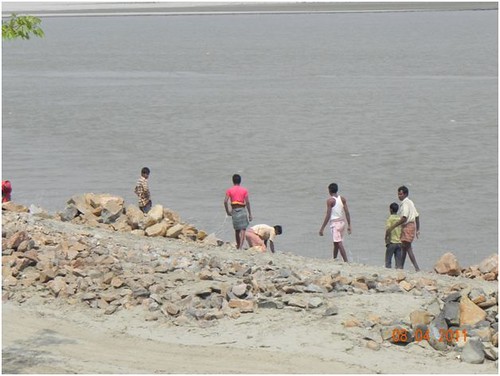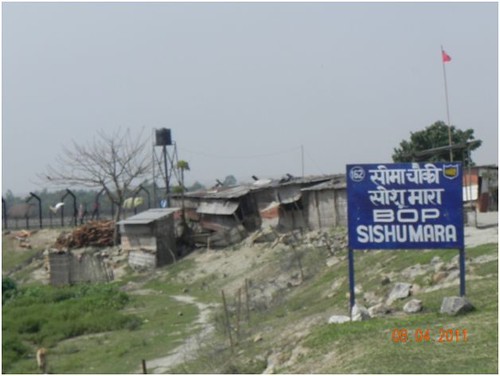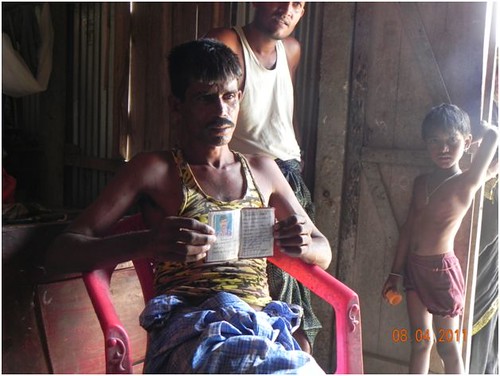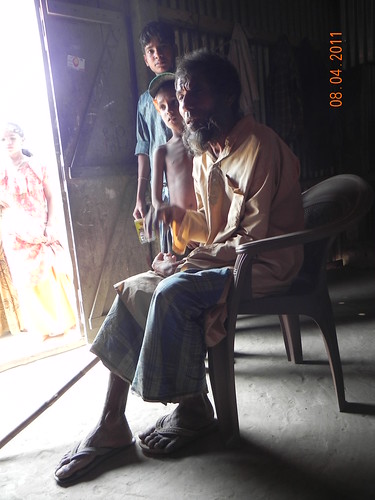By TCN Staff reporter,
Sushumara, Dhubri dist, Assam: ‘Everything is fine here. There is absolutely no problem at all at the border’, said a BSF officer at Sishumara BOP, Dhubir district of Assam, about 250 kms from away from Guwahati. Sishumara is a small village situated at the Indo-Bangladesh border and is inhabited by about 40 households. Though BSF claimed that ‘all is well’, interaction with the villagers gave a different picture.
Situated at a distance of about 20 metres away from the BOP camp of BSF, the villagers are actually displaced people. Foraz Ali, a 40 years old man of the village informed, ‘We are originally the inhabitants of Nengtachar village which existed about 1 km away from here and the entire village is ‘eaten up’ by the river Brahmaputra’. River erosion has completely eroded the village and displaced the villagers. ‘We all resettled here and our land of residence is on lease here. We pay about 2000 INR to the owner as rent per year. Our original village doesn’t exist anymore’, Foraz lamented.

Labourers are working to construct barriers to fight river erosion at Sishumara
Original inhabitants of Nengtachar village shifted to various other places like Baghpara, Oiduba, Kalapani etc of the same area and those left are now residing in Sishumara. “About seven years ago our village was completely eroded by the river Brahmaputra. Since then we are shifted here’, said Hamida Begum, a 50 years old women at Sishumara. ‘What affects our lives is that we have no livelihood option. No work and nothing to feed our stomach’, she added.
India and Bangladesh share a 4,096-km frontier. Cattle smuggling remains one of the main border issue in Indo- Bangladesh border of Dhubri district. Clashes between the BSF guards and smugglers are well known to the villagers. Cattles are given various nicknames by the smugglers to avoid attention by the locals and security forces. Cows of Jersy breed are called ‘bolders’ while small local cows are called ‘chengi’. There is division of labour in transportation of the smuggled cattles. Cattles collected from different places in the state are dumped in nearby areas before transporting to Bangladesh and about 1000 rupees is paid to the shelter giver. Then the real ‘risky’ job starts when the ‘professionals’ are recruited to transport the cattles to Bangladesh by crossing the river. Villagers informed that many people get killed or ‘disappears’ while transporting and most of the time they are killed by the BSF and dead bodies are floated away by the river and hence their dead bodies never get a decent burial. According to a estimate by the viallgers about 40-50 people have been killed or ‘disappeared’ while ‘crossing the river’ in last 7 years. Why people take up such ‘risky profession’?

Sishumara BOP that was originally in Nengtachar and now shifted to Sishumara
‘amnei ki jai nodi paar karte? peter jalai jai’, (why they go cross river just like that ? It’s because of the hunger’), said Rashida Khatun, a 30 years old woman of the village. ‘Only facility we have is a card for rice at the rate of rupees six. Job cards are with the Gram Panchayat president. Our village has no physical existence now. Hence we don’t know about the status of our job cards. We cannt do business too as we don’t have capital. We are not getting house under IAY as we don’t have land now’, said Foraz Ali.
Some of the inhabitants of Sishumara village were farmers and had agricultural lands. One resident informed that he has agricultural land that fall outside the border fence at Sishumara. ‘we are given identity cards and we can go to our land for cultivation at morning 8 am and have to come back by 4 pm. This is not suitable time for us. We want the time to be from 5 am to 5 pm as we do our cultivation work early morning. That’s the tradition’.

Foraz Ali showing his I-card to work outside the fencing
Those who possess no agricultural land are now daily wagers and earn just hand to mouth. Women of the village too work as daily wagers. There is only one primary school and health centre is about 5 km away from the village.
About election, the villagers are not so hopeful. ‘Whoever comes to power, nothing will change our lives. We are poor and working class people. Who will listen to our pain?’, shouted an old lady and went inside her hut.

Razzak Ali, 62 years old was a rich farmer sever years back and had a big family with 5 daughters, two sons and wife. Today his profession is turned into begging as his agricultural lands are completely eroded.
Since independence and partition, border economy in the present Dhubir district of Assam and Meghalaya border areas have been affected adversely. Several factors like creation of bottle necks, closure of border haats, undeveloped communication and transportation system are responsible for the present situation. There is no proper road connecting the border area with places of business interest. Recent initiatives by the government of India and Bangladesh to open the border haats may bring some hope in the near future.
